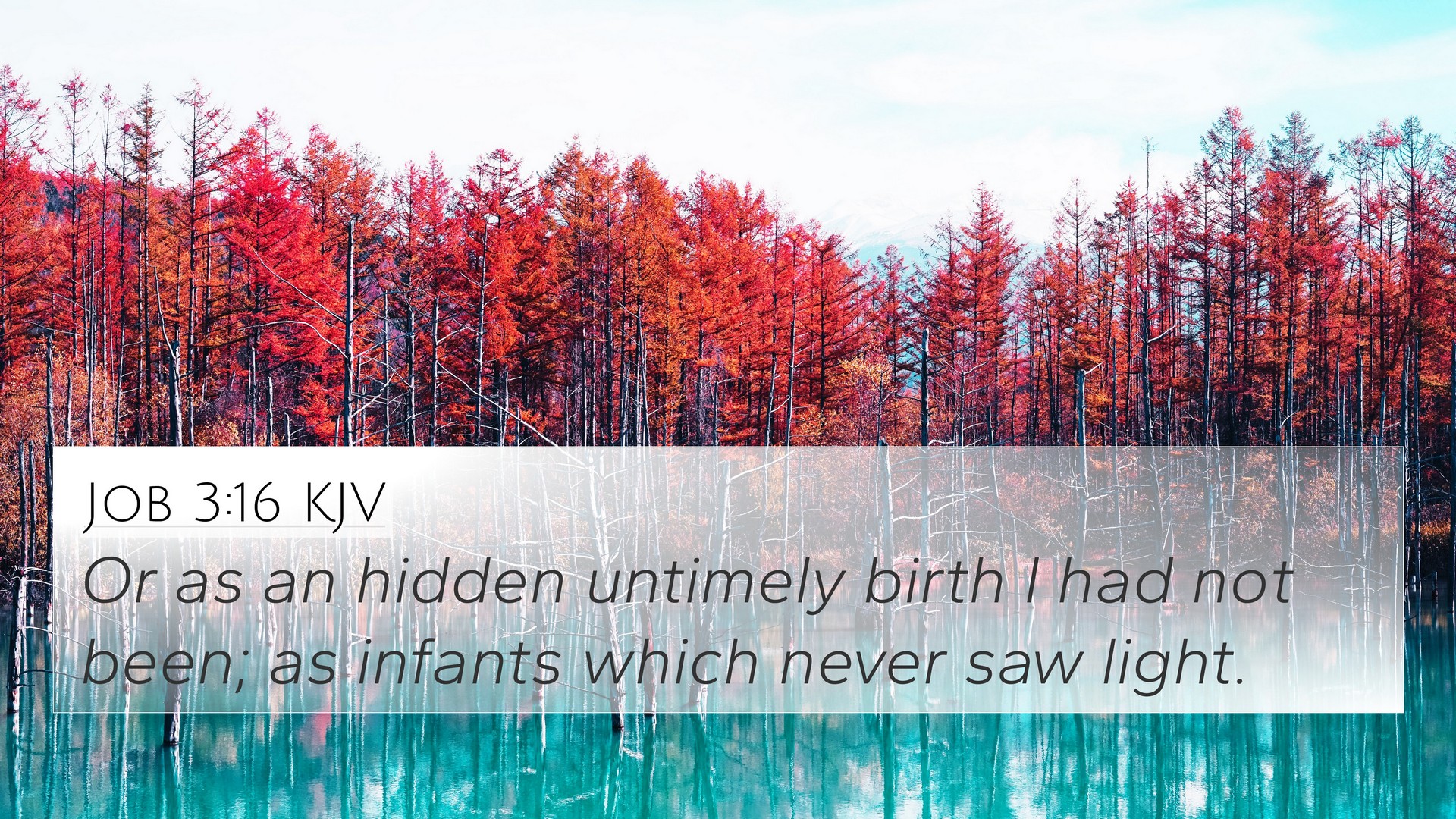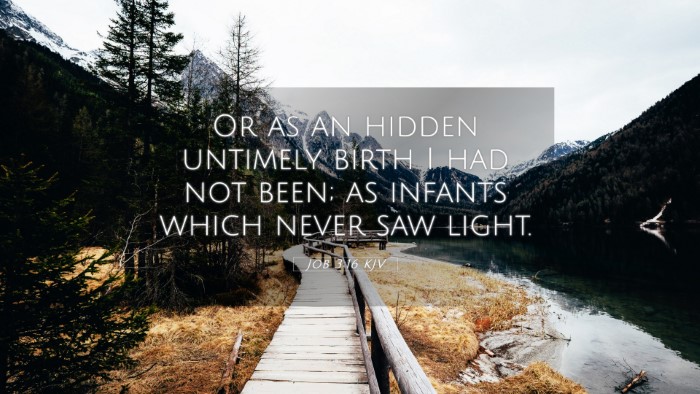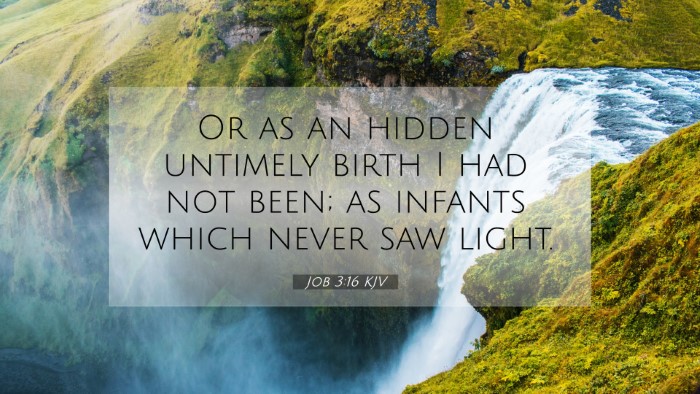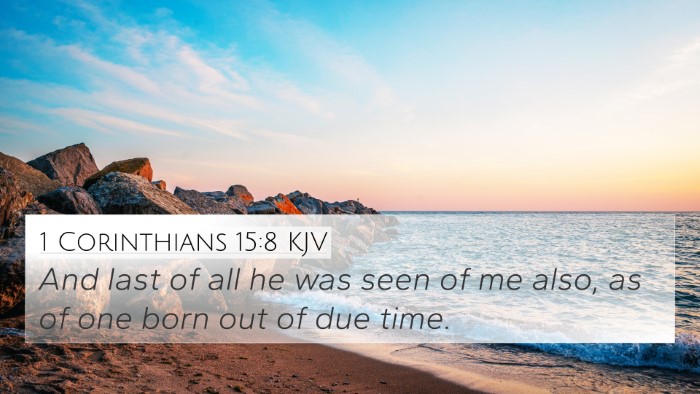Old Testament
Genesis Exodus Leviticus Numbers Deuteronomy Joshua Judges Ruth 1 Samuel 2 Samuel 1 Kings 2 Kings 1 Chronicles 2 Chronicles Ezra Nehemiah Esther Job Psalms Proverbs Ecclesiastes Song of Solomon Isaiah Jeremiah Lamentations Ezekiel Daniel Hosea Joel Amos Obadiah Jonah Micah Nahum Habakkuk Zephaniah Haggai Zechariah MalachiJob 3:16 Similar Verses
Job 3:16 Cross References
Or as an hidden untimely birth I had not been; as infants which never saw light.
Uncover the Rich Themes and Topics of This Bible Verse
Listed below are the Bible themes associated with Job 3:16. We invite you to explore each theme to gain deeper insights into the Scriptures.
Job 3:16 Cross Reference Verses
This section features a detailed cross-reference designed to enrich your understanding of the Scriptures. Below, you will find carefully selected verses that echo the themes and teachings related to Job 3:16 KJV. Click on any image to explore detailed analyses of related Bible verses and uncover deeper theological insights.
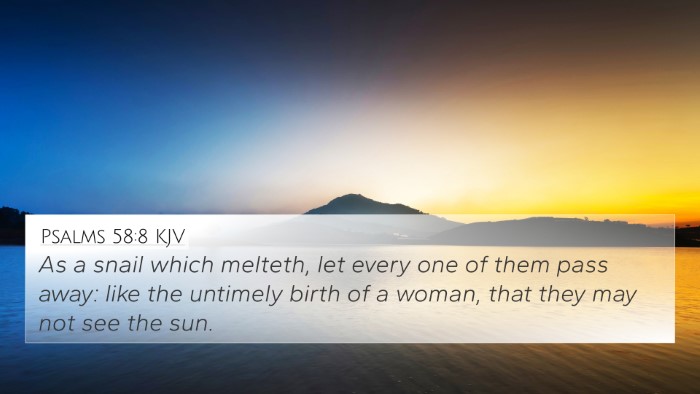
Psalms 58:8 (KJV) »
As a snail which melteth, let every one of them pass away: like the untimely birth of a woman, that they may not see the sun.
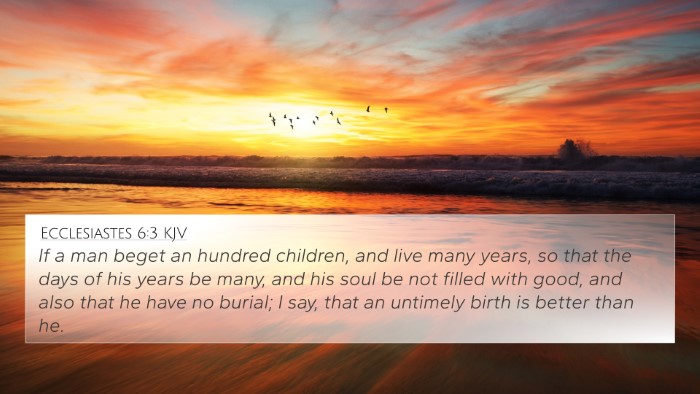
Ecclesiastes 6:3 (KJV) »
If a man beget an hundred children, and live many years, so that the days of his years be many, and his soul be not filled with good, and also that he have no burial; I say, that an untimely birth is better than he.
Job 3:16 Verse Analysis and Similar Verses
Understanding Job 3:16
Job 3:16 states: "Or as a hidden untimely birth I had not been; as infants which never saw light." This verse comes from a profound context where Job, in his distress, laments the day of his birth, questioning the purpose of life and existence in the throes of his suffering. Below is a summarized analysis of this verse drawing insights from various public domain commentaries: Matthew Henry, Albert Barnes, and Adam Clarke.
Verse Analysis
In this verse, Job expresses a deep sorrow over his existence. He wishes he had never been born, comparing his existence to that of a stillborn child. The commentary insights reflect:
- Matthew Henry: He emphasizes the futility of life when suffering overwhelms. Henry notes Job's desire to be like a hidden birth, which symbolizes a life that did not endure the agony of existence.
- Albert Barnes: Barnes interprets the comparison to "infants which never saw light" as a poignant expression of Job’s anguish. He elaborates on the sadness of life that ends before it begins, drawing attention to the human longing to understand the purpose behind one’s suffering.
- Adam Clarke: Clarke focuses on the emotional struggles facing Job, viewing his contemplation of being born dead as a reflection of the pain that overshadows life's joys. He stresses the psychological impact of Job's affliction.
Thematic Connections and Cross-References
Job 3:16 resonates thematically with several other biblical texts that explore themes of suffering, existence, and the meaning of life. Below are significant cross-references:
- Ecclesiastes 6:3: "If a man beget an hundred children, and live many years, so that the days of his years be many, and his soul be not filled with good, and also that he have no burial; I say, that an untimely birth is better than he."
- Psalms 58:3: "The wicked are estranged from the womb: they go astray as soon as they be born, speaking lies."
- Psalms 139:15-16: "My substance was not hid from thee, when I was made in secret, and curiously wrought in the lowest parts of the earth."
- Lamentations 3:6: "He hath set me in dark places, as they that be dead of old."
- Romans 9:11-12: Discusses the legacy of the unborn and the divine purpose in existence.
- Jeremiah 20:17: "Because he slew me not from the womb: or that my mother might have been my grave, and her womb to be always great with me."
- Isaiah 44:24-25: Reflects God’s sovereignty and purpose in creation, adding depth to conversations about the value of life.
- Philippians 1:21: "For to me to live is Christ, and to die is gain." This verse captures the essence of purpose in suffering and existence.
- Job 10:18-19: Job expresses similar sentiments about wishing he had never been born or had died at birth.
- Job 14:1-2: "Man that is born of a woman is of few days, and full of trouble. He cometh forth like a flower, and is cut down." This verse parallels Job's lament regarding the brevity of life.
Conclusion
Job 3:16 reveals the depths of human despair that can prompt questions about the meaning of life. By linking this verse with others, we see a broader conversation about suffering, purpose, and existence within the biblical narrative.
For those studying the Bible, these connections can enhance understanding through tools such as a Bible concordance or Bible cross-reference guide. Whether engaging in cross-referencing Bible study methods or exploring thematic Bible verse connections, the scriptures provide a rich framework for examining life's profound questions.
